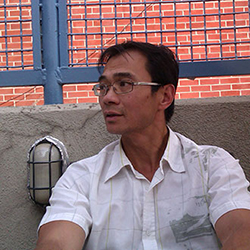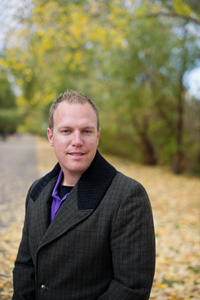On "Unreadable" Text: David Eso
in Conversation with Weyman Chan

Malahat poetry board member David Eso and Calgary poet Weyman Chan discuss experimental poetry, the Calgary writing scene, and Chan's poem, "Here I Am," published in the Malahat's new Autumn issue.
Weyman Chan works as an electron-microscope technologist by day and writes poetry by night. Talonbooks published his fifth collection, Human Tissue—a primer for Not Knowing, last spring.
I'm keen to hear about the influences at work in your current writerly practice. Can you talk about the genises of your poem "Here I Am," or at least about your recent influences? Like your poem asks, "who do [you] stand on"?
For me, countless instances of Lost Time in the presence of authorial language-rapture. I'm sucked into the belly of someone's shiny spaceship. Poets who've done this to me lately include Garry Thomas Morse, Rita Wong, Shannon Maguire, Liz Howard, Stevie Howell, Jake Byrne. Every writer does their own gig, re-packaging into linear text. They read the world which in turn reads them… Heisenberg says position↔momentum, which also occurs when our language interfaces the world. The energy transfer simultaneously alters perspective and relative position of both. So I have small powers but they're big to me: this authorial transfer of energy between sentient corpus (my life) and graphic residue (them poems).
If there is a traceable motif or tendency that's kept me going from book to book, it's this sense of never being able to say things accurately or aptly, so I have to keep tweaking the language and contorting my mind around these viscous and vapid ideas in an effort to fix this notion of representation in place. To that end, I've been playing with the shifting ground of that metaphysical and graphic mirror that text pretends is us. I'm still pretending that after I've written these stanzas down, that they make sense and add to the integrative totality of what the title is suggesting, so that the poem is the coherent sum of all of its disjointed parts. "Here I Am" is at its most basic a declaration of not caring to make perfect sense. You could look at the poem as a series of disjunctions, failed narrations successfully competing for primacy, a chorus of mushrooms where everything, at the risk of nothing, gets noticed.
My vocabulary is similar to that found in my previous books, where overlays of bioscientific language, Chinese mother tongue, historical and scatalogical references, etc., find their way in. What I'm finding a little different with poems of my latest project, is the playful tension between the strict stanza-positioning, where each four-line stanza alternates between left and right side indentations. It seemed to give me permission to pretend that I was arguing with myself, which in turn freed me to change tone and topicality, even as the shortness of the lines forced a kind of heightend voice-register most conducive to compression and economy, where articles were dropped, every word counterweighed for alternate syntactic uses, and the lines themselves folding in on the weight of their nouns. I get to conflate minutiae writ large in my sandbox—small powers with big responsibilites.
Can you say a few words about the current state of the Calgary poetry scene? Does the scene replicate the boom and bust cycle of the city's economy? Or do the poets move out-of-step-and-joint with more visible layers of the city's human ecology?
The Calgary writing scene has been as vibrant as ever, with spoken word poets and page poets and post-structuralist academic poets and lyrical and pataphysical poets all having their say at different venues, which, happily and quite deliberately, try to include each other. The poetry scene here has become as diverse as any scene in any big city. Different voices, styles, points of view.
I would say that in difficult economical times, the need for clarity and certainty seems to bring out the more narrative & lyrically driven writers… heydays bring exuberance and brash experimentation. This is a bald generalization but definitely the vibe of Calgary is such that if there's an artistic niche to be filled, there will be someone to fill it. Same goes for poetry.
You're currently involed with the production of Calgary's filling Station magazine, which has a mandate to promote experimental writing. The "experimental" label has never sat well with me, as I consider any remarkable work of art an experiment, at least some ways—a "conceptual thaw" in the terms of your poem. Can you tell us a bit about the place in Canadian literature for writing from the less conventional side of the tracks?
Yes, the word "experimental" provokes nervous itchiness in me too, but as a generic tag for marketing purposes, it suffices. filling Station is mandated to offer space for "weird" writing, visual texts, hybrids, and mutants only their creator could love… and there's merit in announcing to the world that your very strange little mag will privilege texts that come at the reader from an oblique point of view, will for instance attempt to reflect the schism between bird language and the human ear's failed translation of it. What's important to remember is that writing is constantly evolving, and there are beautifully fantastical points of view that keep being discovered, by inverting readerly expectations on their head, by having the reader come face to face with a difficult, often deemed "unreadable" text that does not follow standard protocol of the Queen's English or Pound's melopoeia-logopoeia-phanopoeia, whose main thrust is not to narrate or cinematically unfold, but is meant to visually or aurally disrupt, or present an alien or counterintuitive force of will, or illustrate a conceptual idea with language that's unhinged, unmusical, or multi-lobulated and multi-lingual. My job as poetry co-editor is to wrestle with difficult texts, not to problematize them further thru conventional lenses that might judge the writing too freaky. To apply a more sensitive instrument of understanding, one in line with the internal logic of a poem's intent. If the text seems to operate consistently and intelligently and purposefully within the domain of its own set of rules, chances are, the author of that text is plumbing an original, evocative, and provocative niche that's worth publishing.
To what extent are you an "experimental" poet? Are you not also a lyric poet and sometimes a narrative one? What poets served as your initial inspirations?
I think overcategorizing my own creativity isn't productive. I just read lots and allow myself to be influenced by what I've read in equal measure with how I let myself be influenced by the words I write and overwrite on top of previous ideas and texts. The critical thinking I perform that happens before during and after the words flow somehow make it look like poems. The process is intuitive, slow, and not afraid of changing and shifting. No one should do what fails to surprise them. The very act of writing for me has to invite surprise, every word should rub off the previous word like a new and exciting experiment. So sometimes the lines come out like slurm squeezed out of a tube. Other times, I seem to deliberately want to say something simple and coherent, and so it comes out as a conventional poem. I guess that's when I'm in control of a "narrative stance" from the getgo. But there's always that itch, to not say the obvious, and to make it new not to the reader first, but to myself.
Poetic inspirations! So many: Atwood, Plath, Rumi, Hopkins, Frank O'Hara, Szymborska, Wah, Miki, Phyllis Webb, James Wright, Franz Wright, Charles Wright, Bishop, Pound, Sharon Olds, Mary Oliver, Wallace Stevens, Kroetsch, Adrienne Rich, Odysseus Elytis, Lorca, Neruda, my sister's high school best buddy Jeannie Dong who wrote my sister a short poem called "intense spirits" which was the first time that nerdy noodly armed no-good-at-sports kid saw the possibilities of language fit to burst from inside stunted line breaks.

David Eso
* * * * * * * *









